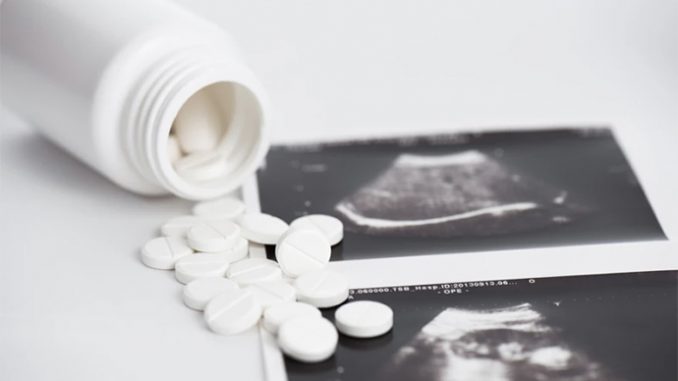
Earlier this month, Texas Governor Greg Abbott signed new anti-abortion legislation to end the availability of the “abortion pill” in his state. Acknowledging that more than 19,000 abortion pills are shipped into Texas each year—with many of them used to circumvent the state’s heartbeat law and other protections—the Governor signed HB-7, a bill known as the “Woman and Child Protection Act.”
The bill is designed to apply to anyone—including doctors who prescribe abortion medication, companies like Aid Access who mail abortion pills to all 50 states, and even to friends or relatives—who order or transport pills to their pregnant family member or friend.
While pregnant women who seek out abortion pills for themselves or take the pills are exempt from being sued under HB-7, the law authorizes private citizens to bring civil lawsuits against anyone who distributes or provides abortion pills to people in Texas. Monetary awards of up to $100,000 can be given to successful plaintiffs.
The Texas law’s arrival is a welcome—if belated—response to growing concerns about the abuses associated with the abortion pill that have emerged in all states. These drugs have killed thousands of unborn children every year. What is lesser known is that coerced and subversive abortions are already happening as angry spouses, partners, abusers, or traffickers are finding ever more creative ways to administer the abortion pills to unsuspecting pregnant women who wanted to keep their babies.
Earlier this year in Texas, Justin Anthony Banta was charged with capital murder and tampering with evidence after he allegedly ordered abortion pills online and administered the pills to his unsuspecting pregnant girlfriend by secretly crushing the pills and putting them into her cookies and beverage. The next day, Banta’s girlfriend miscarried her healthy unborn child, who Banta’s girlfriend wanted to keep and had refused to abort even though he was demanding she do so. The 39-year-old Banta remotely reset his cellphone in an attempt to hide the crucial evidence of his online purchase of the pills.
The Banta capital murder case is an important one because it will advance the longstanding legal provision that defines a fetus as a person. Until Roe v. Wade was overturned, the unborn child was not given constitutional protections. But now, the idea of personhood remains contested terrain. According to an interview given to The Texas Tribune earlier this year, Southern Methodist University Professor Joanna Grossman views the Banta case as an attempt to move further in that direction. “The purpose of this has nothing to do with caring whether this woman was victimized, but it’s about trying to establish fetal personhood in a more direct way than they’ve been able to,” said Grossman.
For the pro-life community, this is long overdue. Pro-lifers know that the unborn child is a person, and they also know that coerced abortion has been a problem for decades. Texas is just the first to attempt to address this directly after the overturning of Roe v Wade.
There was a similar Texas case in 2022, when 39-year-old Houston attorney Mason Herring admitted to secretly dissolving an abortion drug into his wife’s drink to forcibly abort their unborn child. Herring’s wife found “Cyrux packaging” (abortion pills) in the trash in her home and believed he had crushed the pills and secretly administered them to her during her 20th month of pregnancy. While her child survived, the baby was born 10 weeks premature and spent nearly four months in the Neonatal Intensive Care Unit. Last year, Mason Herring pleaded guilty to “injury of a child and assault of a pregnant woman as part of a plea agreement. He had initially faced a more serious charge of assault to induce abortion. Mrs. Herring told a New York Times reporter that she believed this was “a flagrant and profound injustice,” describing her husband’s attempt to kill their unborn child as a “wicked act of deception.”
Melanie Israel, a Visiting Fellow at the DeVos Center for Life, Religion and Family at the Heritage Foundation, has documented several more of these types of forced abortion cases using medication abortion pills. In a Heritage Foundation report, Hill wrote:
The Biden administration gutted safety protocols on dangerous abortion drugs that had stood for more than 20 years. No longer must a doctor see a woman in person to rule out life-threatening risks or accurately date a pregnancy. Now, the Food and Drug Administration endorses telemedicine abortion and abortion-pill-by-mail.
Unfortunately, Texas is an outlier in this type of legislation. Last month, Illinois Governor JB Pritzker greatly expanded state taxpayer complicity in abortion by signing into law a mandate that requires public colleges and universities to provide medication abortions through college campus health centers to any student who requests them. Illinois House Bill 3709, which passed with a House vote of 7 to 4 on March 19, 2025, and was signed into law on August 22, 2025, by Illinois Governor JB Pritzker, mandates that if a public college or university’s student health services include a pharmacy, the school must make medication abortion available at a physical location on campus.
Illinois is not the first state to provide campus-based abortion services. California was the first to provide medication abortion on its campuses. This occurred despite initial resistance by Dr. Guy Nicolette, assistant vice chancellor for University Health Services at the University of California, Berkley, who told a reporter for the New York Times that “there are valid security concerns … Not every provider feels competent or comfortable doing this.”
In an effort to protect unborn children and vulnerable mothers, Texas’s HB-7 signals a courageous attempt to confront both the overt and covert dangers of the abortion pill—especially in cases of coercion and abuse. Faithful Catholics should support the expansion of this law, which calls for a national debate over fetal personhood and the boundaries of reproductive autonomy.
If you value the news and views Catholic World Report provides, please consider donating to support our efforts. Your contribution will help us continue to make CWR available to all readers worldwide for free, without a subscription. Thank you for your generosity!
Click here for more information on donating to CWR. Click here to sign up for our newsletter.












